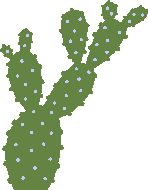 Taking Control of Bermudagrass - August 23, 2000 Jeff Schalau, County Director, Agent, Agriculture & Natural Resources Arizona Cooperative Extension, Yavapai County One of the exciting plants I encountered while visiting Mississippi last week was kudzu (Pueraria lobata): "the vine that ate the South". Introduced from Japan, it was planted widely as a landscape plant and for erosion control across much of the Southern United States. Today, it is estimated to cover seven million acres in the Deep South. Aside from its aggressive nature, kudzu also has medicinal properties and its extracts are used to treat alcoholism, cold symptoms, indigestion, and pain. I saw it everywhere and in my book, it's definitely a weed. The National Park Service, saw it as a historical artifact with beneficial qualities, but that's another story. In Arizona, we have many plants that, like kudzu, are aggressive and invasive. One of these is Bermudagrass (Cynodon dactylon). This tropical grass is widely planted and is useful as a turf or pasture grass. It is also invasive when given supplemental water, unoccupied space, and sunlight. It spreads by stolons (above ground stems), rhizomes (below ground stems), and seed. Live roots can commonly be found ten feet deep in irrigated soil. Newer turf varieties are much less invasive and many of the hybrids do not produce viable seed. However, if you have Bermudagrass in a landscape, you will need to control its spread. Dr. David Kopec, University of Arizona Turf Specialist, recommends the following strategies for controlling, suppressing, and eradicating Bermudagrass. In irrigated turf with well-designed (or at least functional) irrigation systems, the rate of growth can easily be slowed down by decreasing the amount of water applied to the lawn. Start with 3/8" every other day, then decrease this to 1/4" every other day. To calibrate your irrigation system, use several tuna fish style cans distributed evenly across the area, run the system for 5, 10, and 15 minutes measuring the depth of water in each can, and calculate the average depth applied for each time period. Plant growth regulators can also be used, but probably not necessary in most residential landscapes. As mentioned above, Bermudagrass spreads in all directions. This can become a serious problem in perennial borders and shrubs adjacent to lawn areas. However, when Bermudagrass becomes entwined with broadleaf plants, Roundup cannot be used because it would kill everything. Fear not. There are three products that severely damage Bermudagrass without harming true broadleaf (dicot) plants. These are Poast (sethoxydin), Fusilade II (fluazifop), and Whip or Envoy (clethodin). You simply spray it on both the Bermudagrass and broadleaf landscape plants. When applied correctly, the Bermudagrass will die back leaving the landscape plants unharmed. It will require repeated applications to eliminate the Bermudagrass, but it will work. Remember that yuccas, agaves, palms, bulbs, and many other landscape plants are monocots and would also be killed by these products. Always read the product label to and follow directions to avoid unanticipated results. For complete eradication of Bermudagrass, use Roundup Pro (glyphosate). There are several other products that contain the active ingredient glyphosate. Remember, this is a non-selective weed control agent and will control all green vegetation it contacts. For effective control, the Bermudagrass must be actively growing and not water stressed. Bermudagrass is a warm-season grass and is completely dormant in the winter months. For best results, apply at about 10:00 AM and let it sit on the leaves for one or two days without irrigation. Then care for it as if you intended to keep it. It should die in 8 to 10 days. Repeat the application on any remaining green Bermudagrass and rejoice that we do not have kudzu. Maybe if we employ some researchers to study Bermudagrass, they will discover that it too has medicinal properties. Scientists have already discovered that puncture vine (Tribulus terrestris), also known as goat head, is a sort of herbal Viagra. But, this too is another story. The University of Arizona Cooperative Extension has publications and information on turf and ornamentals. If you have other gardening questions, call the Master Gardener line in the Cottonwood office at 646-9113 or E-mail us at mgardener@kachina.net and be sure to include your address and phone number. The Yavapai County Cooperative Extension web site is http://ag.arizona.edu/yavapai/. |